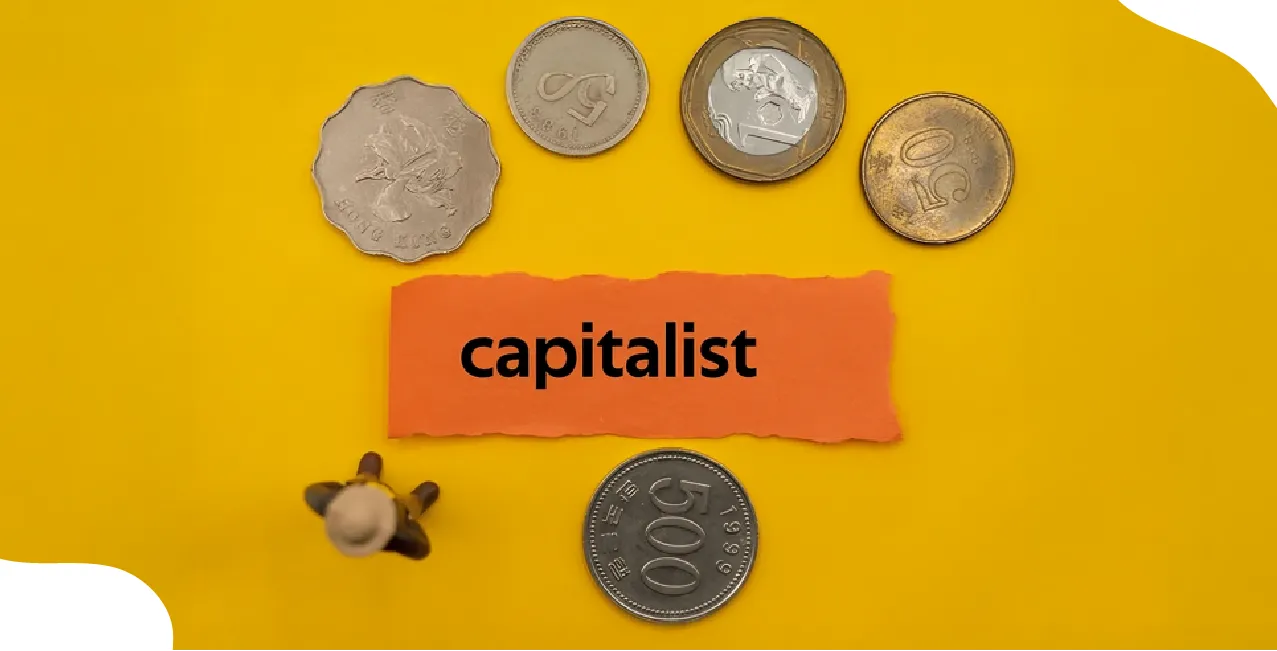What is a capitalist economy: Features, Advantages & Real-World Examples

Check Your Loan Eligibility Now
By continuing, you agree to LoansJagat's Credit Report Terms of Use, Terms and Conditions, Privacy Policy, and authorize contact via Call, SMS, Email, or WhatsApp
A capitalist economy is a system where private individuals or businesses own and control resources and production.
Ritika, a 28-year-old app developer in Bengaluru, created a peer-to-peer lending app. She didn’t need government help, just a good idea and investors. In her capitalist environment, she owned her code, her business, and all decisions were hers. Soon, her app connected 50,000 borrowers and lenders.
She priced her service according to demand, adjusted features based on feedback, and reinvested profits into marketing. When competition grew, Ritika innovated further, adding AI credit checks. Her business boomed. Her friend Kunal, who ran a similar app in a state-regulated economy, had to get each update approved by an authority.
Kunal's app didn’t scale. Ritika’s story shows the beauty of capitalism; it rewards ideas, speed, and customer choice.
In this blog, you'll learn what a capitalist economy means, how it works, its major features, advantages, and disadvantages.
What is a Capitalist Economy?
A capitalist economy is a system where people, not the government, own and run businesses. They also decide what to make, how much to sell it for, and who to sell it to. Prices are set by the market, based on what people are willing to pay.
Before we explain how capitalism works, let’s look at one more example to relate.
Example: Arjun, a 30-year-old from Delhi, makes and sells handmade wallets online. In May 2025, he sold each wallet for ₹700 because people were buying them quickly. But when demand dropped in June, he lowered the price to ₹600. No one told him what to do. He made his own choices. That’s how a capitalist economy works.
Key Features of Capitalism:
Capitalism works on a few main rules. These rules help the economy run in a free and flexible way. Let’s look at them simply.
1. Private Property: People can own things. This includes houses, shops, factories, and even apps or money.
Example: Shruti owns an ed-tech app. It earns ₹3 lakh a month. She can sell it, grow it, or shut it. It’s her choice.
2. Freedom of Enterprise: Anyone can start a business or invest. No one needs permission from the government.
Example: Varun left his ₹18,00,000 job in 2023 to start a fintech company. He built a robo-advisor app with his own ideas.
3. Price Mechanism: Prices go up or down based on demand and supply, not by a government order.
Example: In April 2025, UPI ad slots during IPL cost ₹4,00,000 per day, up from ₹2,00,000, just because more people wanted them.
4. Profit Motive: The main goal of businesses is to earn money.
Example: Deepa started a crypto exchange in 2022. In one year, she made ₹1.2 crore in profits. Her aim was clear: earn and grow.
5. Consumer Choice (Consumer is King): What people want decides what businesses sell.
Example: Paylater apps like LazyPay grew fast in 2024. Why? Young users preferred flexible payments over credit cards.
Read More – What is Capitalism? Features, Pros & Cons of the Economic System
Comparison of Capitalist vs Command Economies
This table highlights the key differences between capitalist and command economies by comparing features like ownership, pricing, business freedom, and innovation.
As seen above, capitalist economies encourage private ownership and innovation, while command economies are strictly controlled by the government, leading to limited economic freedom.
Note: This table shows that in capitalist economies, people and companies make choices. In command economies, the government controls most things.
Advantages of Capitalism:
Ravi, a 29-year-old techie from Noida, launched a digital payment app in 2022 with just ₹10 lakh. Within 2 years, a US fintech company bought it for ₹12 crore. In a non-capitalist setup, such fast success may not happen. During his pitch, he joked, “Main apni favourite hoon,” and the investors agreed.
Why do Many People Love Capitalism?
1. Encourages Innovation: In capitalism, companies want to stay ahead. So, they keep coming up with new ideas, better products, and smart technology. Think of how fast UPI apps or online payment tools have improved in just a few years.
2. Better Use of Resources: Businesses only make what people need or ask for. If something is not useful, they stop making it. This means money, time, and materials are not wasted.
3. Personal Freedom: You are free to open your shop, create a startup, or work in any job you like. No one forces you to follow one path. Many young Indians are now choosing freelancing or fintech jobs by choice.
4. Faster Growth: New ideas grow fast in capitalism. That’s because private investors support startups, and there are fewer rules to stop progress. This is why new payment apps and online finance tools are growing quickly in India.
5. Less Government Control: In capitalism, the government does not control everything. You don’t always need to wait months to get approval or licenses to start something new. This helps businesses move faster and grow freely.
6. Higher Rewards for Risk: If you take a risk, like starting a new fintech app or investing in a new idea, and it works, the profit is yours. You don’t have to share it with the government or anyone else.
7. More Consumer Choice: Capitalism brings lots of options. Whether it’s shopping apps, bank accounts, credit cards, or UPI platforms, you get to pick what suits you best. You are not forced to choose just one brand or service.
8. Easy Investment Flow: Money from other countries can come into the Indian market easily. This helps local startups, especially in fintech, grow quickly. Foreign investors support good ideas with funds and also bring smart tools and skills.
Top Fintech Startups That Succeeded Because of Capitalism
The table below showcases some of the top fintech startups that thrived in capitalist economies, where innovation, private ownership, and competitive markets played a crucial role in their success:
These startups are clear signs of how capitalist systems foster fintech innovation by giving freedom and funding.
Disadvantages of Capitalism
Capitalism is a system where businesses run for profit. But it’s not perfect. It has some problems too.
Example: Reena, a 28-year-old who worked at a delivery company in Delhi, lost her ₹18,000-per-month job when drones were brought in to cut costs. Her boss said it saved ₹40 lakh a year. Profit mattered more than people. Reena sighed and whispered, "Dosti ka ek usool hai madam, no sorry, no thank you." Capitalism moves fast. It doesn’t wait for anyone.
- Wealth Inequality: In capitalism, rich people keep getting richer, while many others struggle. One person may earn ₹5 crore a year, while another barely earns ₹10,000 a month.
- Exploitation Risk: Workers can be underpaid even if they work hard. To save money, companies may give low salaries but expect long hours.
- Monopoly Power: When one company becomes too big, it can stop others from growing. Small shops often shut down because they can’t compete with big brands.
- Environmental Harm: Factories keep making more to earn more. This can cause air, water, and land pollution, which harms the planet.
Major Disadvantages of Capitalist Systems in Fintech
While capitalism has supported fintech growth, it also brings certain challenges. The table below highlights major disadvantages of capitalist systems in the fintech sector with examples:
These issues show that without proper regulations and inclusive practices, capitalism in fintech can lead to unequal access, job loss, and ethical concerns around consumer rights.
Also Read - What is a Mixed Economy? Meaning, Features & Examples Worldwide
Why Fintech and Capitalism Go Hand-in-Hand?
Fintech grows best in places where businesses are free to create, invest, and move fast. Capitalism gives that freedom. It supports ideas, money flow, and fast growth, everything fintech needs.
Example: In India, UPI started in 2016 with government help. But later, private companies like PhonePe, Google Pay, and Paytm helped it grow to over 11.5 billion transactions in May 2025. That’s how both government and private players worked together. This mix is called mixed capitalism, and it helps fintech reach everyone, everywhere.
Conclusion
Capitalism has changed the way we live and trade. It brings freedom, competition, and fast progress. But it also brings challenges like inequality and risk. In the fintech world, capitalism fuels apps, ideas, and investment. Like "Picture abhi baaki hai mere dost," capitalism is still evolving. Understanding it helps individuals and nations grow smarter in money and life.
FAQs.
Q1. Which are the top capitalist countries?
USA, UK, Singapore, India (mixed model).
Q2. What is the main feature of capitalism?
Freedom to own, trade, and earn profit.
Q3. Is India a capitalist economy?
India follows a mixed economy model, part capitalist, part government-led.
Other Informative Pages | ||
About the author

LoansJagat Team
Contributor‘Simplify Finance for Everyone.’ This is the common goal of our team, as we try to explain any topic with relatable examples. From personal to business finance, managing EMIs to becoming debt-free, we do extensive research on each and every parameter, so you don’t have to. Scroll up and have a look at what 15+ years of experience in the BFSI sector looks like.
Subscribe Now
Related Blog Post
Recent Blogs
All Topics
Contents
Quick Apply Loan
Consolidate your debts into one easy EMI.
Takes less than 2 minutes. No paperwork.
10 Lakhs+
Trusted Customers
2000 Cr+
Loans Disbursed
4.7/5
Google Reviews
20+
Banks & NBFCs Offers
Other services mentioned in this article



.png)




